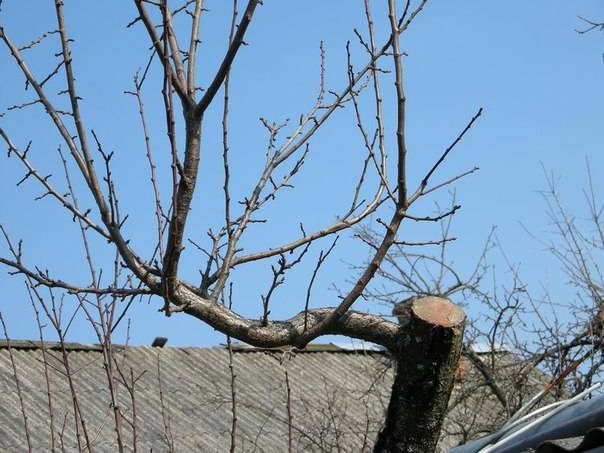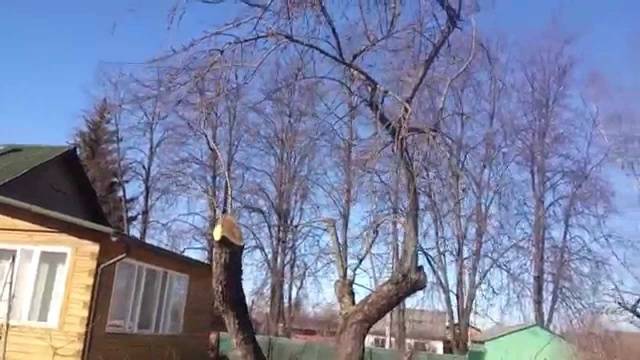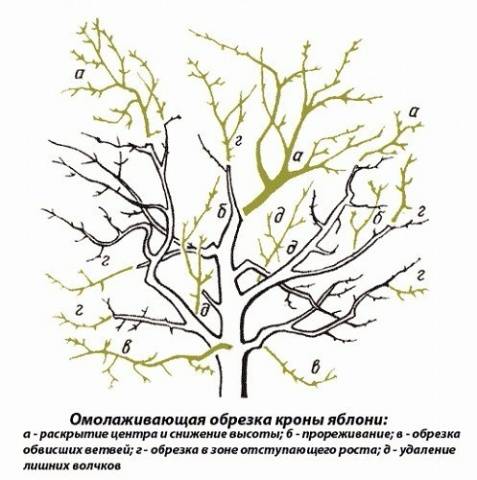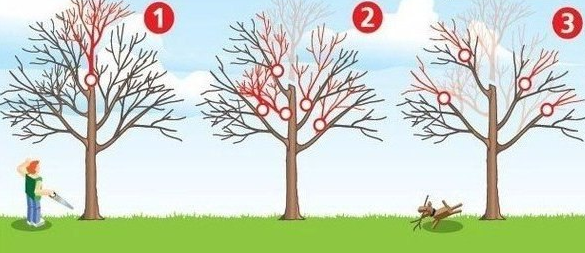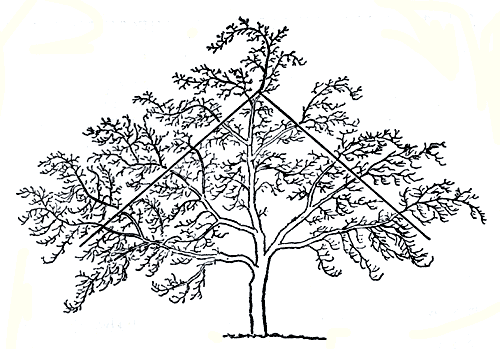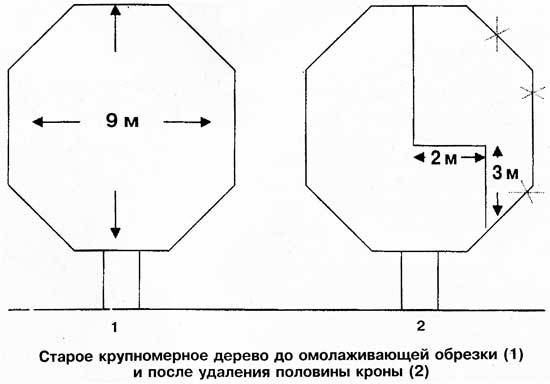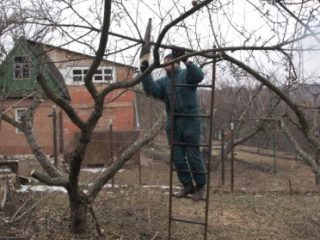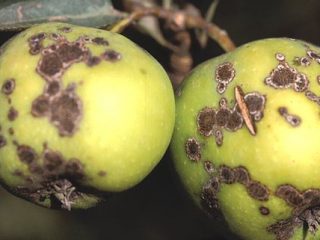Content
Probably, at least one apple tree grows on every household plot. This fruit tree generously gives its harvest to the owner, requiring only a little attention in return. The minimum plant maintenance is pruning. Young seedlings are pruned to form a crown, but old trees are rejuvenated in this way. In order to correctly carry out the procedure for rejuvenating old apple trees, you need to know the principles and optimal timing of its implementation.
Why prune old apple trees
Uncontrolled growth of an apple tree can lead to the fact that the plant shades the entire garden plot, and at the same time it stops producing crops. Old apple trees without rejuvenation can die altogether. Wherein pruning allows you to replace old branches with young, fruiting shoots and form a beautiful compact plant crown. Rejuvenation of old apple trees allows you to increase yields due to the competent redistribution of nutrients. On well-formed trees, each branch receives the required amount of sunlight, which contributes to an even, full-fledged fruit ripening. The absence of excess greenery ensures normal air circulation, preventing the spread of diseases and insect pests.
Thus, pruning old apple trees allows you to get a beautiful, neat tree on the site and a tasty, "healthy" harvest of ripe fruits.
When is the best time to prune a fruit tree
Among gardeners, disputes do not stop when it is better to cut apple trees: in the spring or in the fall? On this score, each gardener has his own opinion.
Professionals recommend:
- Prune young seedlings in the spring, before the active stage of sap movement begins. This will prevent the still immature tree from freezing in the winter.
- Prune old apple trees in the fall. As the temperature drops, they fall into a dormant state, and pruning causes minimal damage to them. Until spring, all wounds will heal, and the apple tree will begin its new life cycle without delay in growth. In this case, winter frosts are not terrible for the plant.
- In the summer, you can only prune some branches to thin out the crown on the apple tree.
- In the southern regions, it is possible to prune young seedlings and adult apple trees in winter, but this procedure must be carried out very carefully so as not to damage the fragile frozen crown.
Analyzing the above recommendations, we can say that pruning old apple trees in the fall is optimal. It allows you to rejuvenate the tree without causing it suffering. Already with the onset of spring, such a plant will delight you with fresh greens and in a timely manner will give tasty, large fruits in large quantities.
Trim an apple tree in the fall is needed at a time when the foliage has already fallen and the movement of sap in the body of the plant has stopped, but in this case it is not worth waiting for frosts. Unfortunately, it is not possible to name the exact date for the event due to the climatic characteristics of each region. So, each owner should independently monitor the weather forecast and cut the fruit tree about 3-4 weeks before the onset of stable frosts.
Basic rules for pruning
Throughout the growing period, starting from the moment the seedling is planted, the gardener must cut the apple tree annually, observing the basic rules and principles.They depend more on the age of the fruit tree: for the first 5 years it is necessary to form a crown, then care consists in removing abnormally growing and diseased branches. An apple tree that is 20 years old is considered old and needs to be rejuvenated. Unlike sanitary pruning and thinning, the procedure for rejuvenating an apple tree in autumn should be carried out according to the following rules:
- It is necessary to rejuvenate only healthy apple trees, which after the procedure will be able to fully develop and bear fruit. Trees with a lot of dry and diseased, broken branches should be replaced with completely young seedlings. There is no point in cutting them off.
- When rejuvenating, you need to remove large branches, therefore, to minimize damage, the event should be carried out while the plant is at rest.
- In the process of rejuvenation, care should be taken to remove branches that most impede the penetration of sunlight deep into the crown.
- Before proceeding with rejuvenation, you need to prepare a saw and a pruner. The instrument must be sharp and disinfected.
- It is recommended to start rejuvenation with the removal of the largest branches. Using the principle: it is better to delete one large branch than many small ones.
- All branches must be removed at the trunk itself, without leaving hemp. This will prevent the development of diseases in the cut.
- All broken, dry and improperly growing branches are subject to mandatory removal.
You won't be able to rejuvenate a tree quickly, so be patient. For the full implementation of the procedure, it will take 2-3 years, depending on the neglect of the apple tree. Pruning old and sick, as well as "extra" branches in accordance with the above proposed rules, should be carried out in the first and second years of rejuvenation. Pruning a large number of branches in one year can kill the plant.
The final stage of formation should be carried out in a sparing mode, observing the rules:
- The massive skeletal branches should be pruned, leaving a 3.5 m long section.
- You need to remove old shoots that interfere with the development of young branches.
- Old branches under actively developing young shoots should be removed.
It is quite easy to form mature trees, which at the initial stage of cultivation had a clear crown outline and were regularly thinned out. In this case, rejuvenation can be carried out in 1-2 years without much effort and damage to the plant. It is much more difficult to correctly form a neglected old tree, which has been growing its green mass uncontrollably over the years. In this case, you need to be guided by the following rules:
- You need to shorten the old apple tree by 1/3 of the entire height.
- The most thickened parts of the crown must be thinned out.
- Branches that have already stopped their growth and have not developed for several years must be removed.
- In one year, no more than 2-3 large branches with a thickness of 10-15 cm should be removed.
- Small fruiting branches must be cut into several buds in order to activate growth and make them stronger.
- Slices on branches up to 2 cm in diameter heal painlessly and quickly.
- The lower branches on the apple tree should not obscure the upper shoots.
- The formation of old apple trees is easier to carry out according to the selected scheme during several years.
Having familiarized yourself with the principles and rules, it becomes clear how to rejuvenate an old apple tree. Based only on the proposed theses, you can develop your own strategy and form the crown of the apple tree competently, giving it a decorative look and returning vitality. The trimming schemes proposed below will help to visually assess the scale and technology of the work.
Schemes for the formation of old apple trees
Old apple trees can be formed arbitrarily, focusing on the basic principles and rules, or adhering to a certain scheme. The pruning scheme can be any, you can find a lot of options in various sources. We will try to describe two schemes for pruning old apple trees in the fall. One option will be of interest to busy and novice gardeners, and the second option on how to rejuvenate an apple tree is intended more for professionals.
A simple option for rejuvenating old apple trees
A simple scheme for the formation of apple trees is based on the basic rules of rejuvenation. Its principle is as follows:
- It is imperative to remove diseased, broken and dry branches.
- Shorten all healthy branches by 2 m.
- When rejuvenating, open each branch to the sun as much as possible.
This scheme is clearly demonstrated in the picture:
Pruning an old apple tree according to this scheme should begin with the removal of dry, diseased and broken branches. You also need to thin out the crown close to the trunk a little. It is recommended to perform these actions in the first year of formation. Next fall, it will be necessary to shorten each branch of the apple tree by 1.5-2 meters. In the third year of formation it is recommended to remove one third of all young shoots. Thinning and sanitary pruning should be done every year. The method duplicates the biological laws of plant development and is one of the most gentle. It is he who is often used by novice gardeners in their practice.
A modern way to rejuvenate
For professional and experienced gardeners, it is recommended to use one coordinate method rejuvenation of the old apple tree... It is performed in 2 stages, and the time interval between stages can be several years. To make it clear how to properly cut an old apple tree in the fall in accordance with this modern technology, we will try to give a detailed description of it and illustrative pictures:
- In the fall, make a deep pruning on an old apple tree, removing most of the crown from the south side. It is recommended to leave a green "hat" 3 m high and 2 m wide.
- When carrying out deep pruning, you should try to make as few cuts as possible.
- All cuts must be processed with garden pitch. Slices on thick branches should be additionally wrapped in black polyethylene for speedy wound healing.
- After the south formed side gives the first flowering and fruits, you can resort to trimming the remaining part of the crown. This second stage of rejuvenation can occur in 3-4 years. It should be carried out in the fall, observing the same rules that were used when pruning the southern side of the tree.
You can rejuvenate not only the aerial part of the apple tree, but also its roots. Root rejuvenation should be done in spring. To do this, you need to dig a trench 4 m wide from the trunk of the plant and 60-70 cm deep. Over the entire area of the trench, you need to slightly cut the roots. Sprinkle nutritious soil on top of the remaining root system with the addition of phosphorus and potassium fertilizers.
The two proposed methods of rejuvenation require a lot of time and, unfortunately, one cannot expect a quick result from such actions. This is probably why some gardeners advise to carry out a cardinal pruning of an apple tree in one year, reducing the crown on the tree by 3-5 times at once. Of course, such a decision in some cases may be justified, but for a fruit tree, such deep pruning will be stressful and it is highly likely that the apple tree will not survive such changes at all.
You can find out some erroneous points in rejuvenating old apple trees from the video:
Conclusion
It is quite difficult for novice gardeners to immediately understand and assimilate all the above information, so we suggest watching a video clip in which a specialist will show by example how to cut an old apple tree and give some practical advice on how to carry out the rejuvenation procedure:
The result of rejuvenating a pruned apple tree can be seen in the video:
A visual demonstration makes it possible to assess the need for this procedure: a mass of fresh, green shoots and a lush crown will give the old tree a new life, and in a few years the updated plant will thank the competent owner with a tasty harvest for the care and efforts shown.
